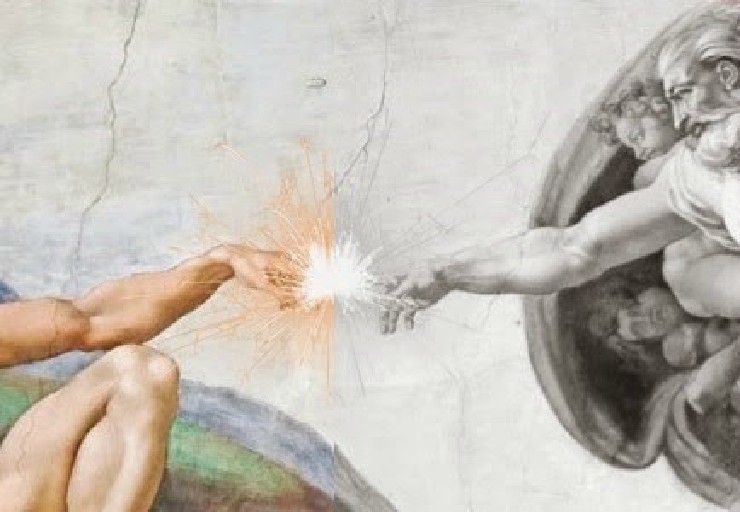As a technology strategist, I am constantly discovering fascinating analogies of “real life”—remarkable corollaries to some of the most profound, transcendent, and universal truths we can ever contemplate. That’s what I love about science. Let me offer a case in point: the wonder of electrical current. You know, the principle that Ben Franklin discovered one stormy night with a kite and a key (don’t try this at home). Conducting and controlling currents are the most fundamental functions in electronics—and possibly in living a spiritual life, as well. Let me explain:
The controlling of electrical current—turning it on or off—is the work of transistors, which are really nothing more than tiny switches. These switches, arranged to create circuits of varying complexity, rely upon a power source, e.g., the energy stored in a battery or tapped from an electrical outlet in your home, to light up everything in your life from your television to your thermostat. If no energy flows to or through those transistors, absolutely nothing happens; the device is essentially turned off, dormant, inert, useless—or even dead. It’s only when the current flows that the magic happens. With me so far?
Now here’s the thing: transistors “turn on” only when the voltage applied to their inputs reaches a certain threshold. It takes a certain voltage level to overcome the various resistances inherent in a transistor. And when it does, current flows. So if any work is to get done, it must first overcome resistance. This means that the device conducts electricity only when the right conditions are present. We joke in this business that these little devices—built in silicon—are called semiconductors because sometimes they work, and sometimes they don’t. And that’s why.
There’s another concern in electronic systems, and that is noise. When an electrical signal level is near, but not quite at the magical threshold level, there can be a bit of confusion. And that’s because these in-between voltage ranges are “undefined.” We actually refer to these signal levels as being “invalid.” Neither here nor there. If an input or output of a transistor is left floating in this no man’s land, it is actually subject to all sorts of corrupting influences, like crosstalk and other nasty forms of interference. When that happens, you really can’t be certain of what the transistor will do. You could say it’s a bit double-minded, unstable in its ways. Good circuit design works to eliminate problems like this so that the device can function properly and reliably under all conditions. You expect no less from your electronic devices.
So, where are we going with all this? Well, it turns out that living a life of Imitation involves these very same basic operating principles: drawing power from a proper source, overcoming myriad resistances (intrinsic and extrinsic), shutting off the confusing noise, and living deliberately in order to also live reliably under all sorts of life conditions, and not only the agreeable ones.
It also turns out that these are the very themes that Thomas à Kempis explored in his timeless little book, The Imitation of Christ. He recognized that most people seem to live their lives dammed up against that critical switching threshold, never fully overcoming the resistances to conducting the world-changing power of the Holy Spirit. In other words, they never really “turn on.” But it’s not without good reason, he admits. And that’s because it’s not easy. “There is one thing which keeps many back from spiritual progress and earnest amendment of life,” he wrote. “And that is a horror of the difficulty and labor of the conflict.”
Well, okay. That sounds like resistance, all right—horror, difficulty, labor, conflict! Right up there with lions and tigers and bears. No doubt there is pretty good company to be found this side of barriers like those. Who can blame anyone for wanting to avoid horror, difficulty, labor, and conflict?!
But, of course, there’s a flipside, or shall I say downside. And that is keeping just this side of the barrier necessarily restricts the work of the Spirit, attenuating its power, precluding its flow of current, and forcing it to conform to the boundaries that our limited reason and resources (including faith) consider acceptable. Consequently, the work of the Spirit is cut short. The current doesn’t flow. The life purpose isn’t realized.
A consumer electronics product that performed this way wouldn’t exactly get five-star reviews on Amazon—getting only half-way there only to ultimately fail is just a complete non-starter. But are things really any different in the spiritual realm? Well, to finish the thought started by à Kempis, consider his admonitions about half measures that go down like a bitter pill in a spoonful of sweet jelly:
“Jesus has now many lovers of His Heavenly Kingdom, but few bearers of His Cross. He has many desirous of His consolation, but few of His tribulation. He finds plenty of companions of His table, but few of His abstinence. All wish to rejoice with Christ, but few wish to bear anything for His sake. Many follow Jesus as far as the breaking of bread, but few to the drinking of the cup of His Passion. Many reverence His miracles, but few follow the ignominy of His Cross. Many love Jesus as long as things go well with them. Many praise and bless Him as long as they receive certain consolations from Him. But if Jesus were to hide His face from them, or forsake them for a little while, then they would begin to murmur, or grow depressed.”
Frankly, in the face of crosses, tribulations, abstinence, and ignominy, it’s just easier to stay put. And in our Americanized edition of Christendom, there’s plenty of strong support for that position. Terra firma is safe and secure. Consequently, the critical mass of Christians decline to venture forth across that daunting barrier. How, then, are we to take stock of this? How do we define our meaning and purpose in such a tepid milieu?
Viktor Frankl, the Holocaust survivor and existential therapist (it’s not a big stretch to imagine how those two distinctions might have come together), answered an interesting question in his book, Man’s Search for Ultimate Meaning. Interesting because his answer seems more apropos to American Christendom than the irreligious Jews he calls out: “And what,” he asks, “is the reason the irreligious man does not go further? It is because he does not want to lose the ‘firm ground under his feet.’”
But while such a man may feel a sense of security and control upon that firm, dry land, he is, as Frankl continues, isolated, contained, and cut off from the prize. “The true summit,” he says, “is barred from his vision; it is hidden in the fog, and he does not risk venturing into it, into this uncertainty. Only the religious man hazards it. The more religious a man is, the more he will respect the decision of his fellow man to not go further.”
Now, our interest here is in those who hazard it. Indeed, the command of Jesus to follow Him and imitate His life can give one pause. It’s especially hard for those who resist it. The fact is, for many, the earnest imitation of Christ is unexplored territory, with the result being that essential spiritual vistas and insights still lie undiscovered by the average believer. We simply don’t know what we don’t know. And unless we venture into that territory, we never will know. Of course there is an element of danger and risk in all explorations. Every pioneer, adventurer, and scientist knows that. And the same holds equally true for spiritual explorations beyond the barrier.
A reality check is in order at this point. What exactly are we hazarding? The fact is, it’s not all roses this side of the barrier, either. The Rhineland Mystics remind us that there are no people living on this earth in undisturbed peace and calm, without troubles and frustrations, and for whom all things go according to their own will. “Suffering here is inevitable,” they say, “whatever we may do to avoid it. And the moment we are free of one difficulty, then two more take its place.” Ain’t it the truth.
Perhaps we’re just misinformed about what lies on the other side of the barrier. Maybe the anticipation of imaginary sufferings to be endured there is just that—imaginary. Jean-Pierre de Caussade, the 18thcentury French Jesuit, offered, “If the business of becoming holy seems to present insufferable difficulties, it is merely because we have a wrong idea about it.” Do we?
Jesus, Himself, tried to clear the matter up when he encouraged his would-be followers, assuring them that His yoke is easy, and His burden light. That His commandments are not grievous. That He asks nothing of us without giving us the strength to perform it. That the further we enter in, the greater the grace we receive to successfully navigate this alien territory. That His commandment never seeks to destroy life, but to foster, strengthen and heal it. Quite a different picture than the Night Gallery image of horror, difficulty, labor, and conflict…
We’ll leave the last word on this to à Kempis.
“My friend,” he concludes, “you cannot have perfect liberty unless you entirely deny yourself. All self-seekers and lovers of self; all covetous, anxious persons; and all who wander about and are ever in quest of ease and comfort, and not the things of Jesus Christ, are in bondage. Hold fast this short and summary saying: Forsake all, and you shall find all; leave your desires, and you shall find rest. Give your mind to this, and when you have put it into practice, you shall understand all things.”
How hard can it be?


